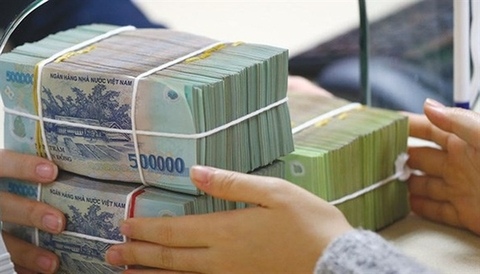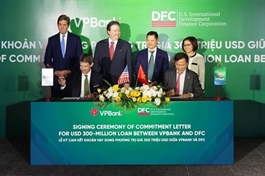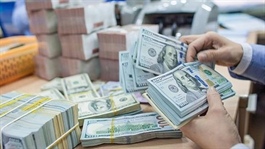Anti-money laundering bureau to be granted additional autonomy and power
Anti-money laundering bureau to be granted additional autonomy and power
Anti-money laundering should receive greater operational autonomy and independence, according to the State Bank of Việt Nam (SBV).

Việt Nam's anti-money laundering bureau is to be granted additional power. — VNA/VNS Photo |
In a recent proposal to the central government, SBV advised that the Anti-Money Laundering Bureau be given additional roles under the supervision of the central bank's governor, such as the power to issue specialised documents and guidelines; authority in receiving, processing, transferring, and exchanging information on anti-money laundering and counter-terrorism financing both domestically and internationally.
According to the proposal, the bureau is authorised to request governmental agencies, organisations and individuals to provide information, records, and relevant documents related to money laundering, terrorist financing, and other crimes related to money laundering; handling and transferring information or records related to money laundering, terrorist financing, or other crimes related to money laundering; creating a list of organisations and individuals at high risk of money laundering; coordinating and exchanging information with other governmental agencies for inspection, investigation, prosecution, trial, enforcement, and other state management agencies.
The bureau's director will also represent Việt Nam in the signing of memoranda of understanding (MOUs) on cooperation with domestic and international agencies regarding anti-money laundering and counter-terrorism financing.
The proposal also covered the bureau's ability to access information collected and maintained by other governmental agencies directly or indirectly, as well as the ability to cooperate with other governmental agencies to support inspection, examination, and monitoring activities related to anti-money laundering.
According to the SBV, the proposal, once approved by the central government, will transform the bureau into Việt Nam's first financial intelligence unit, a member of the Egmont Group of Financial Intelligence Units, an international organisation that facilitates cooperation and intelligence sharing between national financial intelligence units (FIUs) to investigate and prevent money laundering and terrorist financing.
This is in accordance with the Southeast Asian country's pledge at the Financial Action Task Force (FATF) Plenary Meeting in June this year, which committed Việt Nam to a 17-point Action Plan, to be implemented before May 2025 and a part of the country's effort to enhance the quality and quantity of financial intelligence analysis products and information sharing.
The action plan specifically set out two objectives for Việt Nam as follows:
"Vietnam needs to ensure and demonstrate the technical independence and autonomy of the Anti-Money Laundering Bureau, including related to its analysis and dissemination functions; allocation of sufficient resources (both personnel and financial), and independent engagement in information exchange even if this unit is part of the State Bank of Vietnam's structure or operates as an independent agency (September 2024)."
"The Anti-Money Laundering Bureau needs to enhance the quality and quantity of financial intelligence analysis (both operational and strategic) and dissemination (proactive or upon request) to law enforcement agencies in line with Vietnam's risk profile by increasing the number of analysed suspicious transaction reports (STRs); establishing feedback mechanisms with reporting entities to improve the quality of STRs; and accessing the broadest possible sources of information and using appropriate technological and analytical tools (May 2025)."
The country must commit to implementing an action plan to address deficiencies in the anti-money laundering/counter-terrorist financing/proliferation of weapons of mass destruction financing framework under the close monitoring of FATF. In cases where a country does not complete this action plan within FATF's set timeframe, FATF may call for punitive measures against these countries to safeguard the global financial system from the risks of money laundering/terrorist financing/proliferation of weapons of mass destruction financing.






















